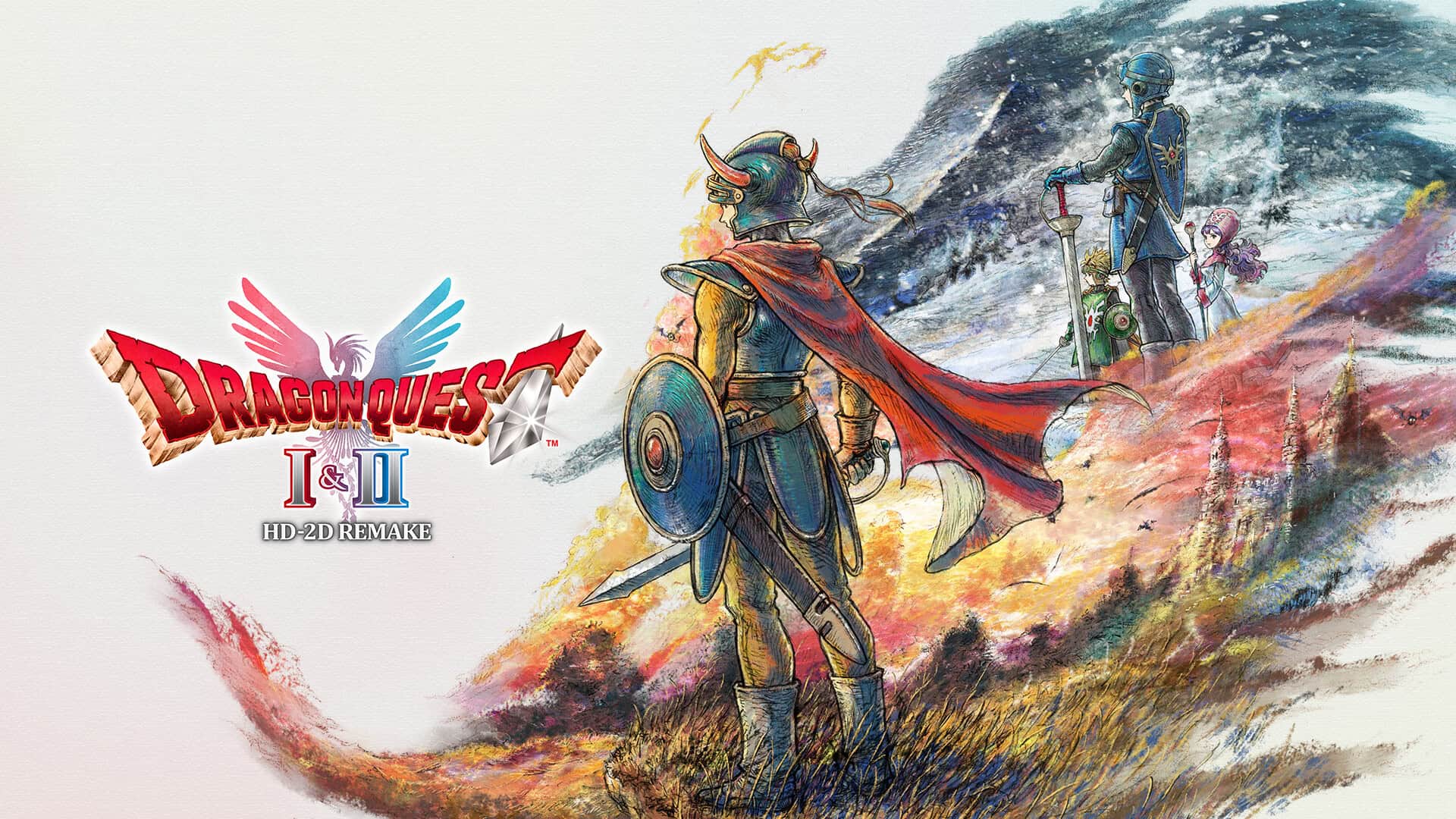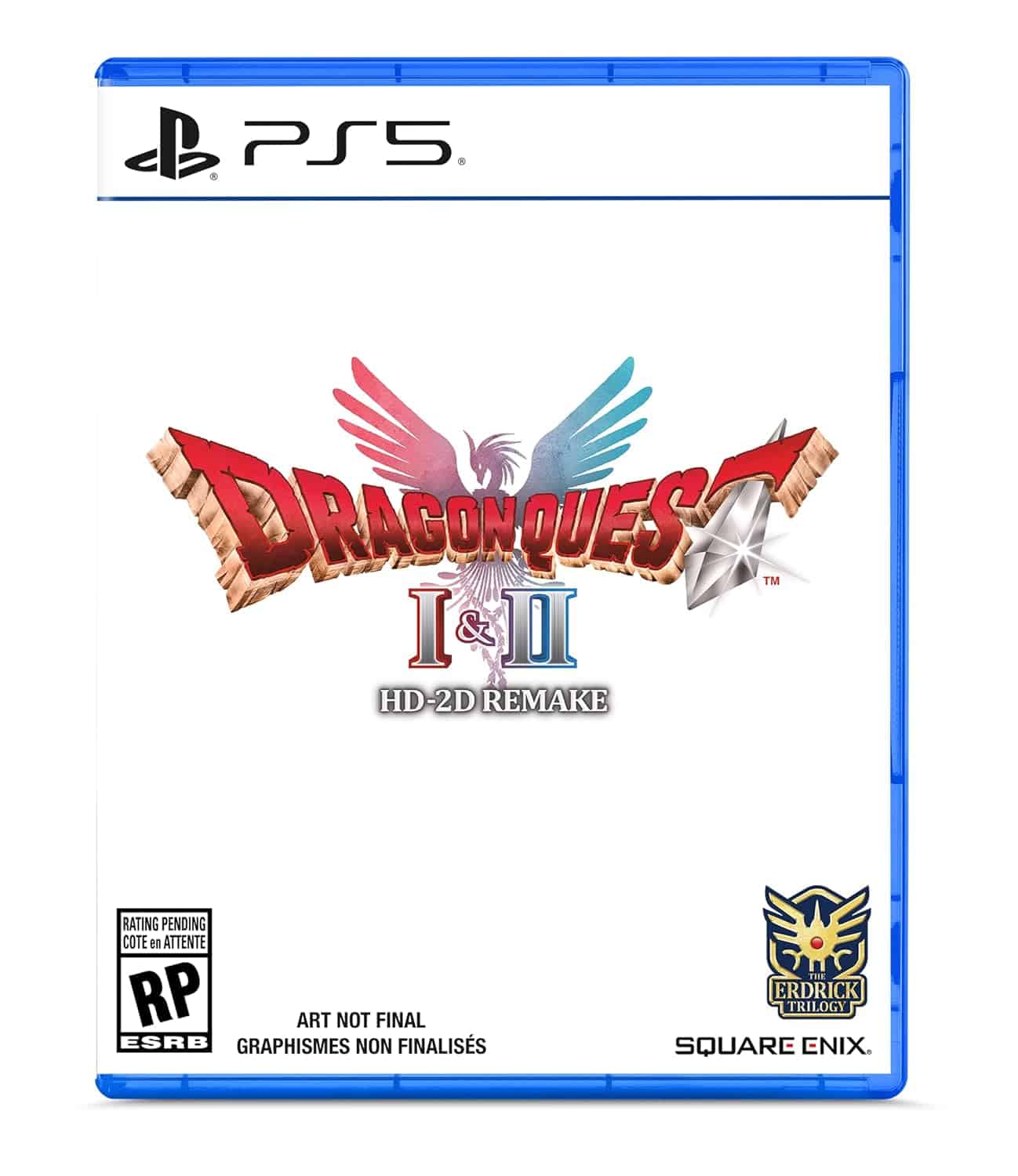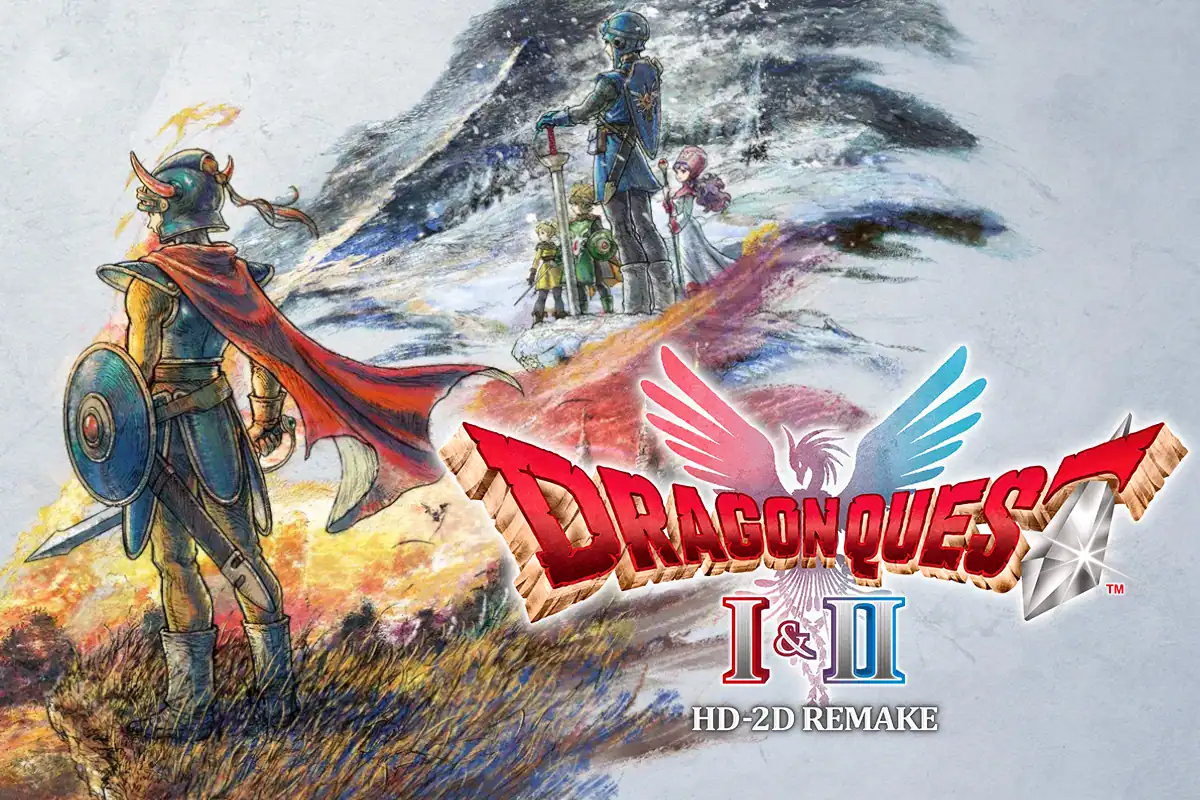Square Enix has officially confirmed that Dragon Quest I & II HD-2D Remake will release on October 30, 2025, across a wide range of platforms: PlayStation 5, Xbox Series X|S, Nintendo Switch, Nintendo Switch 2, and PC (Steam and Microsoft Store). This long-awaited revival brings the original classics into the modern era with the signature HD-2D visual style that has become a hallmark of nostalgic remakes under Team Asano.
This launch also marks the completion of the Erdrick Trilogy, following the successful release of Dragon Quest III HD-2D Remake in 2024, which served as a chronological prequel to the first two games.
You can pre-order the game on Amazon here: https://amzn.to/4mywmAt
A Fresh Coat for Two RPG Legends
Originally released in the late 1980s, Dragon Quest I & II are the bedrock of the Japanese RPG genre. Their influence stretches across decades of game development, from Final Fantasy to Pokémon. With the HD-2D remake, Square Enix preserves the soul of these classics while updating their visuals and gameplay for a new generation.
Expect beautifully reimagined environments, high-definition sprite animations, dynamic lighting, and an orchestrated soundtrack. The blend of pixel-art characters and 3D environments creates a visually distinct experience, while the camera effects and scene transitions breathe new life into familiar towns, castles, and battlefields.

Gameplay Modernization
Beyond aesthetics, Dragon Quest I & II HD-2D Remake is receiving meaningful quality-of-life updates:
- Multiple enemy encounters in Dragon Quest I, previously limited to single enemy battles.
- Adjustable battle speed and auto-battle options, allowing for streamlined progression.
- Visible enemy weaknesses, a new feature aiding strategic planning in combat.
- Updated UI and minimap to better guide exploration.
- Expanded story segments and cutscenes to enhance narrative depth.
While Dragon Quest I was once a 10-hour solo quest and Dragon Quest II around 15–20 hours, Square Enix has expanded both titles with additional areas and character development, potentially extending the runtime to over 40 combined hours.

Pre-Order On Amazon: https://amzn.to/4mywmAt
Editions, Pre-Orders & Bonuses
Square Enix is offering multiple purchasing options:
🟩 Standard Edition – $59.99
- Digital or physical copy of Dragon Quest I & II HD-2D Remake.
🟨 Collector’s Edition – $149.99 (Square Enix Store Exclusive)
Includes:
- Physical game copy.
- Character & Monster Acrylic Blocks Complete Set (6 characters, 2 bosses, Slime dog companion, and logo).
- Outstanding Outfit Kit (Ring of Strength, Slime Earrings, Mad Cap, Arriviste’s Vest).
- 2 exclusive digital wallpapers.
🟥 HD-2D Erdrick Trilogy Digital Collection – $99.99
- Includes Dragon Quest I, II, and III HD-2D Remakes.
- Ideal for newcomers or those who skipped the 2024 DQ III release.
Save Data Bonus
If you’ve played Dragon Quest III HD-2D Remake and still have save data, you’ll unlock:
- Dog Suit for Dragon Quest I.
- Cat Suit for Dragon Quest II.
Additionally, all pre-orders come with the Trouble-Free Travel Kit, packed with helpful early-game items like Elevating Shoes and seeds that boost Strength, Defense, Agility, Life, and Magic.
Why This Release Matters
With Final Fantasy increasingly leaning into high-concept realism, Dragon Quest remains a bastion of classic turn-based RPG design. The HD-2D remakes demonstrate how older mechanics and stories can still captivate modern audiences when presented with care and polish.
More than just a remake, this release celebrates the legacy of JRPGs—bringing 40 years of history full circle for both die-hard fans and newcomers. It’s a rare opportunity to experience the origins of the genre in a format that feels both nostalgic and forward-looking.
Stay tuned—October 30 is shaping up to be a celebration of classic RPG storytelling reborn for a new generation.
Best Story Games to Experience in 2025
Story-driven experiences have become increasingly important to players seeking meaningful engagement beyond gameplay mechanics. These narrative adventures transport players to rich worlds filled with complex characters, emotional journeys, and thought-provoking themes. The best story-driven games combine exceptional writing, voice acting, and innovative storytelling techniques to create experiences that rival movies and novels in their emotional impact.
Story-focused games come in many forms, from epic open-world adventures to intimate character studies. They span genres including role-playing, action-adventure, horror, and indie experiences. What unites them is their commitment to narrative excellence, creating memorable moments that resonate with players long after the controller is set down.
1. The Last of Us
The Last of Us stands as one of gaming’s most compelling narrative experiences. Released by Naughty Dog in 2013, it tells the story of Joel and Ellie’s journey across a post-apocalyptic America ravaged by a fungal infection.
What sets The Last of Us apart is its character development and emotional storytelling. The relationship between Joel, a hardened survivor, and Ellie, a teenage girl immune to the infection, evolves naturally throughout their dangerous journey.
The game has been praised as potentially the greatest story ever told in video games. Its powerful narrative doesn’t rely on typical video game tropes but instead focuses on human connections and moral complexity.
The Last of Us balances intense gameplay sequences with quieter moments that develop its characters. These quieter sections often reveal the most about the characters and their motivations.
In The Last of Us Part 2, the flashback sequences provide some of the most poignant storytelling in the series. These moments step away from combat to focus on character relationships and emotional depth.
The game’s environmental storytelling deserves recognition too. Abandoned buildings, discarded notes, and the transformed landscape all tell stories of their own without a single word of dialogue.
Critics and players alike consider the franchise among the elite tier of narrative-driven games. It stands alongside titles like Red Dead Redemption 2 and God of War as benchmarks for storytelling excellence in gaming.
The Last of Us transcends simple entertainment to deliver a story about love, loss, and what remains of humanity in desperate circumstances. Its impact extends beyond gaming, as evidenced by its successful adaptation to television.
2. Red Dead Redemption 2
Red Dead Redemption 2 stands as one of the most captivating storytelling experiences in gaming history. The 2018 release from Rockstar Games takes players to the American frontier in 1899, following the journey of outlaw Arthur Morgan and the Van der Linde gang.
Many players consider RDR2 to have the best narrative they’ve ever experienced in a video game. The character development throughout the story creates deep emotional connections with players as they witness Arthur’s personal transformation.
The game’s story succeeds through its exceptional voice acting and motion capture performances. Each character feels authentic and three-dimensional, with complex motivations and personal struggles that unfold throughout the lengthy campaign.
Beyond the main storyline, the game world itself tells countless smaller stories. Random encounters and side missions provide glimpses into frontier life that enrich the overall narrative experience.
RDR2’s storytelling power comes partly from its setting during a pivotal historical period. The dying days of the Wild West create a backdrop of changing times, with themes of loyalty, redemption and adaptation woven throughout.
Some players believe RDR2 is undefeated from a technical and story standpoint, claiming no other games come close. The attention to historical detail and commitment to authentic character development set a new standard for interactive storytelling.
The prequel nature of the game adds another layer of narrative depth. Players familiar with the original Red Dead Redemption discover new meaning in familiar characters and events, while newcomers experience a complete story arc.
Many gaming enthusiasts consider it the greatest game of all time due to its storytelling prowess. The emotional journey players experience alongside Arthur Morgan remains powerful years after its release.
3. The Witcher 3: Wild Hunt
The Witcher 3: Wild Hunt stands as one of gaming’s greatest narrative achievements. Released in 2015 by CD Projekt Red, this open-world RPG takes players on an emotional journey through a war-torn fantasy world.
What makes The Witcher 3’s storytelling exceptional is how it weaves together personal tales with grand political narratives. The main quest to find Geralt’s adopted daughter Ciri feels deeply personal, while still connecting to larger world events.
The game is particularly renowned for its iconic “Bloody Baron” storyline, which deals with complex themes of abuse, grief, and redemption. This questline alone demonstrates the game’s willingness to explore morally gray situations without easy answers.
Player choices matter significantly throughout the adventure. Decisions made early in the game can have unexpected consequences hours later, creating a sense that the player truly shapes the narrative.
Side quests in The Witcher 3 break the typical RPG mold. Rather than feeling like filler content, these missions often contain some of the game’s best character interactions and storytelling moments.
The game’s two expansions, Hearts of Stone and Blood and Wine, received particular praise for their narrative quality. Many players consider these add-ons to contain some of the best storytelling in the entire series.
The Witcher 3 sets itself apart by making its world feel alive with consequences. Characters remember Geralt’s actions, and communities change based on the player’s decisions.
While some fans argue that previous Witcher games had stronger elements, The Witcher 3’s expansive scope allowed it to develop characters and plot lines more thoroughly. This additional story time creates a more emotionally impactful experience.
The game has been called the most accomplished video game ever in storytelling, setting a new standard for narrative design in open-world RPGs.
4. God of War
The God of War series stands as one of gaming’s most compelling narrative experiences. The franchise follows Kratos, a Spartan warrior whose tragic past drives him on a vengeful journey through Greek mythology and later Norse realms.
The original Greek trilogy tells a tale of revenge and consequence. God of War I, II, and III form the main storyline, with each installment building upon Kratos’ complex character development. His transformation from rage-filled warrior to a more nuanced character is captivating.
Many fans consider the first God of War particularly special. It introduces players to Kratos and his motivations while establishing the emotional foundation for the entire series. Despite his fury and hotheadedness, Kratos proves surprisingly deep as a character.
God of War III represents a high point in the series for many players. The game delivers on both narrative and technical fronts, with some of the series’ best boss battles and impressive visuals. Its polished gameplay complements the dramatic conclusion to the Greek saga.
The 2018 soft reboot took the series in a bold new direction. Moving to Norse mythology, it reimagined Kratos as an older, wiser figure attempting to leave his violent past behind while raising his son Atreus. This father-son dynamic added emotional depth previously unseen in the franchise.
The series also includes several prequels that enhance the main storyline. Chains of Olympus and Ghost of Sparta provide additional context that enriches the overall narrative. These games offer insight into Kratos’ backstory and motivations.
God of War’s success comes from its ability to balance epic mythology and personal storytelling. Players witness Kratos battle gods and monsters while confronting his own demons. This combination of external and internal conflict creates a memorable narrative journey.
5. Mass Effect 2
Mass Effect 2 stands as one of the most compelling narrative experiences in gaming history. The second installment in BioWare’s space opera trilogy excels through its character-driven storytelling and meaningful player choices.
The game is frequently praised for having the best narrative not just in the Mass Effect universe, but arguably across gaming as a whole. Its strength comes from focusing on building deep relationships with your crew members while facing tremendous risks.
Commander Shepard’s mission to stop the Collectors creates a perfect backdrop for personal stories. Each squad member has complex motivations and backstories that players gradually uncover through loyalty missions.
These character-focused missions don’t just provide emotional depth – they directly impact the game’s suicide mission finale. The consequences feel real and earned based on player decisions throughout the adventure.
The Normandy serves as more than just a ship – it becomes a home where relationships develop. From Garrus’s calibrations to Mordin’s singing, these small moments create authentic connections that players remember long after completing the game.
Combat and exploration received significant improvements from the first game. The shooting mechanics feel tighter, and the cover system works more intuitively, making combat scenarios more engaging.
Mass Effect 2 remains the high point in an amazing trilogy. Its 4K makeover in the Legendary Edition allows its visuals to hold up nearly as well as its strong narrative elements and character development.
The game dedicates significant time to building meaningful relationships and then puts them at great risk. This emotional investment makes every decision matter in ways few other games achieve.
While some critics note the main story contains only about five crucial missions, this structure allows the character-driven content to shine. The focus on squad members creates a rich tapestry of stories within the larger narrative.
6. NieR: Automata
NieR: Automata stands as one of the most innovative story-driven games of recent years. Released in 2017, this action role-playing game developed by PlatinumGames has earned a reputation as a masterpiece of narrative design.
The game follows androids 2B, 9S, and A2 as they battle machine lifeforms that have invaded Earth. Humans have fled to the moon, and these androids fight in their stead. This premise might sound simple, but the execution is anything but.
What makes NieR: Automata special is how it uses gameplay mechanics to enhance its storytelling. Players must complete multiple playthroughs to experience the full narrative, with each run offering new perspectives and revelations.
The philosophical themes explored in the game are profound yet accessible. Questions about consciousness, humanity, and purpose permeate the experience. The game challenges players to think deeply about what it means to be alive.
Many players consider NieR: Automata to be one of the best games they’ve ever played. Its combat system blends seamlessly with its storytelling, creating a cohesive experience that’s greater than the sum of its parts.
The game’s soundtrack deserves special mention. Composer Keiichi Okabe created a haunting, beautiful score that enhances every emotional moment. The music shifts dynamically based on gameplay, adding another layer to the experience.
While some games with complex stories require knowledge of previous titles, NieR: Automata can be enjoyed without playing earlier entries. That said, returning players will appreciate the subtle connections to previous games.
Critics and fans alike have praised how NieR: Automata should have changed gaming narratives forever with its fresh approach to storytelling. Few games since have matched its ambition and execution.
For those seeking a game with emotional depth, philosophical themes, and satisfying gameplay, NieR: Automata delivers on all fronts. It remains a benchmark for storytelling in interactive entertainment.
7. Final Fantasy VI
Final Fantasy VI has earned its place as one of the most celebrated JRPGs of all time. Released in 1994 for the Super Nintendo Entertainment System, it was the last 2D mainline entry in the series before the franchise shifted to 3D.
The game features a compelling narrative that many fans believe still holds up today. Set in a world where magic meets technology, the story follows a diverse cast of characters in their struggle against the Gestahlian Empire and its court mage, Kefka Palazzo.
What makes Final Fantasy VI exceptional is its ensemble cast approach. Rather than focusing on a single protagonist, the game distributes character development across multiple individuals, each with their own motivations and backstories.
The game is particularly notable for featuring one of gaming’s most memorable villains. Kefka’s transformation from a seemingly comedic antagonist to a god-like entity who succeeds in destroying the world halfway through the game was revolutionary for its time.
The World of Ruin section that follows this cataclysmic event allows players to experience a post-apocalyptic narrative rarely seen in games of that era. Each character’s journey through this broken world adds emotional depth to the storytelling.
Some character arcs, like the Relm/Strago/Shadow storyline, are considered underdeveloped by critics. However, the overall narrative quality remains impressive considering the technical limitations of the time.
In polls asking about the best Final Fantasy stories, FF VI consistently ranks among the top entries. A GameFAQs poll showed it receiving 12.4% of votes for best story in the franchise, competing with heavyweights like FF VII and FF Tactics.
Final Fantasy VI represents an important transition point in the series’ history, bridging the gap between traditional RPG storytelling and the cinematic approach that would define later entries. Its blend of steampunk aesthetics, magical elements, and human drama continues to resonate with players decades after its initial release.
8. Chrono Trigger
Chrono Trigger stands as one of the greatest RPGs ever made. Released for the Super Nintendo Entertainment System in 1995, this game remains a masterpiece that continues to captivate players decades later.
The game follows Crono and his friends as they travel through time to prevent a global catastrophe. Its narrative expertly balances personal character stories with a world-spanning plot about saving the future from destruction.
What sets Chrono Trigger apart is its revolutionary design. The game eliminated random encounters, showing enemies on the map before engagement. Combat uses the Active Time Battle system with position-based techniques that allow characters to combine abilities.
The development team was a dream collaboration of talent. Square assembled creators from both the Final Fantasy and Dragon Quest franchises, plus character designs by Dragon Ball creator Akira Toriyama. This ultimate RPG mash-up produced something greater than the sum of its parts.
Chrono Trigger’s soundtrack, composed by Yasunori Mitsuda and Nobuo Uematsu, delivers emotional themes that perfectly complement each era and scenario. The music remains iconic and instantly recognizable to this day.
One of the game’s most innovative features was its multiple endings. Decisions made throughout the adventure affect which conclusion players receive, encouraging multiple playthroughs to see every possibility.
The storytelling succeeds through its simplicity and emotional impact. Themes of friendship, sacrifice, and hope resonate throughout the adventure, making players genuinely care about the characters and their world.
For new players interested in experiencing this classic, multiple versions exist across different platforms. The best version depends on personal preferences, with options available on mobile devices, PC, and Nintendo DS.
9. Undertale
Undertale stands as one of the most innovative story-driven games of the past decade. Released in 2015, this indie gem created by Toby Fox challenges traditional RPG mechanics by giving players the option to resolve conflicts without violence.
The game’s narrative brilliance lies in its ability to respond to player choices. Every decision affects the storyline, creating a truly personalized experience. Many players consider it the best storytelling any game has offered in recent years.
Undertale’s cast of memorable characters adds depth to its world. From Sans the skeleton to Papyrus and Undyne, each character has unique personality traits and backstories that unfold as players progress through the game.
The multiple endings provide incredible replay value. The Pacifist, Neutral, and Genocide routes each reveal different aspects of the story and characters. The Genocide route particularly showcases some of the game’s most powerful narrative moments.
What makes Undertale special is how it breaks the fourth wall. The game remembers player actions from previous playthroughs, creating a meta-narrative that few other games have achieved successfully.
The soundtrack deserves special mention as it perfectly complements the storytelling. Each musical piece enhances emotional moments and helps establish the game’s unique atmosphere.
Undertale’s popularity has spawned numerous fan games that continue its legacy. These include titles like Undertale Last Breath and many others that expand on the original’s universe and themes.
Players who enjoy Undertale often seek similar story-driven experiences. Many fans rank it alongside Hollow Knight as one of the best narrative gaming experiences available.
10. SOMA
SOMA stands out as a masterpiece in storytelling within the horror genre. Released by Frictional Games, this sci-fi horror game takes players into a deep underwater facility where questions of consciousness and humanity are explored.
The game’s narrative tackles complex philosophical questions about identity and what makes us human. Players navigate through PATHOS-II, an underwater research facility, following a protagonist who wakes up in mysterious circumstances.
What makes SOMA special is how it weaves its high-minded story that asks many questions about consciousness and existence. The game doesn’t just scare players – it makes them think deeply about what it means to be alive.
The underwater setting creates a claustrophobic atmosphere that amplifies the horror elements. Players must solve puzzles and avoid dangerous creatures while uncovering the truth about the facility and themselves.
Many fans consider SOMA to have perfect narrative writing within the horror genre. The story unfolds naturally through environmental storytelling, audio logs, and character interactions rather than lengthy cutscenes.
The game shares DNA with Frictional’s other horror titles like Amnesia: The Dark Descent and the Penumbra series, but SOMA elevates the formula with its science fiction elements and deeper themes.
SOMA’s ending leaves a lasting impact on players, similar to games like Everybody’s Gone To The Rapture that deliver emotional conclusions. The choices players make throughout the game contribute to meaningful narrative moments.
Critics have praised SOMA for how it grapples with fundamental questions about the mind and body. The game doesn’t offer easy answers but instead invites players to form their own conclusions about the difficult scenarios presented.
The Importance of Storytelling in Games
Storytelling forms the backbone of many memorable gaming experiences, adding depth and purpose to player actions. Games with strong narratives create meaningful connections with players that extend beyond mere gameplay mechanics.
Immersion and Engagement
Storytelling is an essential component of video games, providing context for player actions and creating an immersive experience. When players understand the “why” behind game objectives, they become more invested in completing tasks and exploring the game world.
Narrative elements transform arbitrary button presses into meaningful decisions with consequences. A player defending a village feels different when they know the villagers’ stories and struggles.
Some games like Minecraft offer a “build your own story” approach where players create their own narratives through gameplay. This player-driven storytelling gives art and gameplay deeper meaning.
Games with compelling stories keep players engaged longer, encouraging them to discover what happens next. The desire to see a story’s resolution can motivate players to overcome difficult challenges they might otherwise abandon.
Emotional Impact
Well-crafted game narratives can evoke powerful emotional responses that stay with players long after completing the game. Characters players grow to care about create stakes that enhance every triumph and tragedy.
Video games have a unique storytelling power because they integrate interactivity into the narrative itself. Players don’t just witness a story—they participate in and influence it, creating a deeper personal connection.
Game stories can explore complex themes and moral dilemmas that prompt players to reflect on their own values. These emotional experiences make games more memorable and meaningful.
A well-written story can spark imagination and keep players engaged for hours. The emotional investment players develop can transform a simple gaming session into a profound experience that resonates on a personal level.
Narrative Techniques in Gaming
Game developers use various storytelling methods to engage players and create memorable experiences. These techniques have evolved over time, creating more immersive and emotionally resonant stories within interactive environments.
Interactive Storytelling
Interactive storytelling puts players in control of the narrative, allowing them to influence the story through their choices and actions. Games like The Wolf Among Us use branching dialogue options that change how characters respond and alter story outcomes.
Choose-your-own-adventure mechanics have become more sophisticated in recent years. Titles such as Heavy Rain present players with meaningful decisions that can lead to completely different endings.
Environmental storytelling is another powerful technique. Rather than telling players what happened through dialogue, games like Gone Home reveal narrative through objects, notes, and the environment itself.
Some games implement dynamic storytelling systems that adapt to player behavior. These systems track choices throughout gameplay and adjust future scenarios accordingly, creating a personalized narrative experience.
Character Development
Strong character development forms the foundation of compelling game narratives. Games like The Last of Us create complex protagonists who evolve throughout the story, forming emotional connections with players.
Character arcs are carefully crafted to show growth and change over time. This development often mirrors the player’s own journey through the game, creating a sense of shared experience.
Supporting characters provide depth to the world and often challenge the protagonist’s worldview. Well-written NPCs can create memorable moments that enhance the overall narrative.
Dialogue and voice acting play crucial roles in bringing characters to life. Modern games employ professional actors and motion capture technology to create nuanced performances that convey emotion and personality.
Character relationships also drive many game stories, with complex interactions between characters forming the emotional core of narratives in games like Coffee Talk.
Frequently Asked Questions
Story-driven games continue to captivate players across all platforms. Many gamers seek specific information about which narrative experiences best fit their gaming setup and preferences.
What are the top-rated story-driven games currently available on PC?
PC gamers have access to an impressive library of story-rich titles. The Witcher 3: Wild Hunt remains one of the highest-rated narrative experiences, offering a vast world filled with meaningful choices and consequences.
Red Dead Redemption 2 delivers an emotional journey through the American frontier with remarkable character development. The game’s attention to detail and nuanced storytelling make it a standout title for narrative enthusiasts.
Other top PC narrative games include Disco Elysium, Cyberpunk 2077 (after updates), and the Life is Strange series.
Which single-player games offer the most engaging storylines?
The Last of Us and its sequel provide deeply emotional narratives focusing on complex human relationships in a post-apocalyptic setting. These games are often cited for their exceptional character development and thought-provoking themes.
God of War (2018) reinvented the franchise with a mature father-son story set against Norse mythology. The game balances intimate character moments with epic mythological encounters.
Mass Effect 2 continues to be praised for its character-driven narrative and meaningful player choices that impact the story’s direction.
What are the best story-focused games available on Android platforms?
Mobile gamers seeking rich narratives have several excellent options. Telltale’s The Walking Dead series brings emotional storytelling with meaningful choices to the palm of your hand.
Monument Valley offers a poetic narrative experience through its beautiful puzzle design. The game communicates its story largely through visual storytelling rather than extensive dialogue.
Florence and immersive narrative experiences like Oxenfree also provide compelling stories optimized for touchscreen devices.
What are the latest narrative-rich games that have been released?
Baldur’s Gate 3 has recently stunned players with its reactive storytelling and deep character interactions. The game lets players truly shape their adventure through meaningful choices.
Final Fantasy VII Rebirth expanded on the remake project with an emotional journey that both honors and reimagines the classic story.
Alan Wake 2 delivers a psychological horror narrative that blends multiple storytelling techniques, including live-action segments and meta-narrative elements.
Which games featuring strong story elements are free to play on PC?
Doki Doki Literature Club offers a subversive visual novel experience that cleverly plays with player expectations. The game begins innocently before revealing its true nature.
The first episode of Life is Strange is available free, introducing players to its time-manipulation mechanics and emotional teen drama.
Deltarune Chapter 1 & 2 provides an engaging RPG experience from the creator of Undertale, featuring charming characters and surprising story developments.
What are the most acclaimed story-driven games on PS5?
Final Fantasy XVI has received praise for its mature political intrigue and character-driven plot. The game represents a more focused narrative approach compared to earlier entries.
Horizon Forbidden West continues Aloy’s journey through a beautifully realized post-apocalyptic world. The game expands on the original’s mysteries while introducing new narrative threads.
The most captivating story-based games on PS5 also include Returnal, with its psychological horror elements, and A Plague Tale: Requiem with its emotional sibling journey through medieval France.







